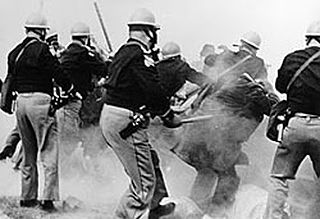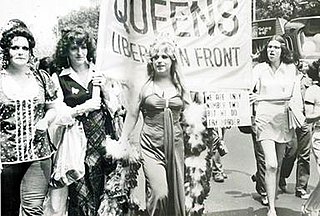
Lesbian, gay, bisexual, and transgender (LGBT) movements are social movements that advocate for LGBT people in society. Although there is not a primary or an overarching central organization that represents all LGBT people and their interests, numerous LGBT rights organizations are active worldwide. The first organization to promote LGBT rights was the Scientific-Humanitarian Committee, founded in 1897 in Berlin.

The LGBT community is a loosely defined grouping of lesbian, gay, bisexual, and transgender individuals united by a common culture and social movements. These communities generally celebrate pride, diversity, individuality, and sexuality. LGBT activists and sociologists see LGBT community-building as a counterweight to heterosexism, homophobia, biphobia, transphobia, sexualism, and conformist pressures that exist in the larger society. The term pride or sometimes gay pride expresses the LGBT community's identity and collective strength; pride parades provide both a prime example of the use and a demonstration of the general meaning of the term. The LGBT community is diverse in political affiliation. Not all people who are lesbian, gay, bisexual, or transgender consider themselves part of the LGBT community.
This is a list of notable events in the history of LGBT rights that took place in the year 1995.

Lesbian feminism is a cultural movement and critical perspective that encourages women to focus their efforts, attentions, relationships, and activities towards their fellow women rather than men, and often advocates lesbianism as the logical result of feminism. Lesbian feminism was most influential in the 1970s and early 1980s, primarily in North America and Western Europe, but began in the late 1960s and arose out of dissatisfaction with the New Left, the Campaign for Homosexual Equality, sexism within the gay liberation movement, and homophobia within popular women's movements at the time. Many of the supporters of Lesbianism were actually women involved in gay liberation who were tired of the sexism and centering of gay men within the community and lesbian women in the mainstream women's movement who were tired of the homophobia involved in it.
The Family Research Institute (FRI), originally known as the Institute for the Scientific Investigation of Sexuality (ISIS), is an American socially conservative non-profit organization based in Colorado Springs, Colorado which states that it has "...one overriding mission: to generate empirical research on issues that threaten the traditional family, particularly homosexuality, AIDS, sexual social policy, and drug abuse". The FRI is part of a sociopolitical movement of socially conservative Christian organizations which seek to influence the political debate in the United States. They seek "...to restore a world where marriage is upheld and honored, where children are nurtured and protected, and where homosexuality is not taught and accepted, but instead is discouraged and rejected at every level." The Boston Globe reported that the FRI's 2005 budget was less than $200,000.
Feminist separatism is the theory that feminist opposition to patriarchy can be achieved through women's separation from men. Much of the theorizing is based in lesbian feminism.

The gay liberation movement was a social and political movement of the late 1960s through the mid-1980s in the Western world, that urged lesbians and gay men to engage in radical direct action, and to counter societal shame with gay pride. In the feminist spirit of the personal being political, the most basic form of activism was an emphasis on coming out to family, friends, and colleagues, and living life as an openly lesbian or gay person.
Rites was a Canadian magazine, published for gay, lesbian, bisexual, and transgender communities in Canada from 1984 to 1992.

This article addresses the history of lesbianism in the United States. Unless otherwise noted, the members of same-sex female couples discussed here are not known to be lesbian, but they are mentioned as part of discussing the practice of lesbianism—that is, same-sex female sexual and romantic behavior.
Sarah Lucia Hoagland is the Bernard Brommel Distinguished Research Professor and Professor Emerita of Philosophy and Women's Studies at Northeastern Illinois University in Chicago.

The National Organization for Women (NOW) is an American feminist organization. Founded in 1966, it is legally a 501(c)(4) social welfare organization. The organization consists of 550 chapters in all 50 U.S. states and in Washington, D.C. It is the largest feminist organization in the United States with around 500,000 members. NOW is regarded as one of the main liberal feminist organizations in the US, and primarily lobbies for gender equality within the existing political system. NOW campaigns for constitutional equality, economic justice, reproductive rights, LGBTQIA+ rights and racial justice, and against violence against women.

Discrimination comprises "base or the basis of class or category without regard to individual merit, especially to show prejudice on the basis of ethnicity, gender, or a similar social factor". This term is used to highlight the difference in treatment between members of different groups when one group is intentionally singled out and treated worse, or not given the same opportunities. Attitudes toward minorities have been marked by discrimination in the history of the United States. Many forms of discrimination have come to be recognized in American society, particularly on the basis of national origin, race and ethnicity, non-English languages, religion, gender, and sexual orientation.
Feminist views on sexuality widely vary. Many feminists, particularly radical feminists, are highly critical of what they see as sexual objectification and sexual exploitation in the media and society. Radical feminists are often opposed to the sex industry, including opposition to prostitution and pornography. Other feminists define themselves as sex-positive feminists and believe that a wide variety of expressions of female sexuality can be empowering to women when they are freely chosen. Some feminists support efforts to reform the sex industry to become less sexist, such as the feminist pornography movement.
Julia Penelope was an American linguist, author, and philosopher. She was part of an international movement of critical thinkers on lesbian and feminist issues. A self-described "white, working-class, fat butch dyke who never passed," she started what she called "rabble rousing" when she was a young woman.

Queens Liberation Front (QLF) was a homophile group primarily focused on transvestite rights advocacy organization in New York City. QLF was formed in 1969 and active in the 1970s. They published Drag Queens: A Magazine About the Transvestite beginning in 1971. The Queens Liberation Front collaborated with a number of other LGBTQ+ activist groups, including the Gay Activists Alliance and the Street Transvestite Action Revolutionaries.
Womyn's land is an intentional community organised by lesbian separatists to establish counter-cultural, women-centred space, without the presence of men. These lands were the result of a social movement of the same name that developed in the 1970s in the United States, Australia, New Zealand, and western Europe. Many still exist today. Womyn's land-based communities and residents are loosely networked through social media; print publications such as newsletters; Maize: A Lesbian Country Magazine; Lesbian Natural Resources, a not-for-profit organisation that offers grants and resources; and regional and local gatherings.
The Nebraska Coalition for Gay and Lesbian Civil Rights, later called the Nebraska Coalition for LGBT Civil Rights, was an advocacy group in Nebraska that existed from 1981 to approximately 2002. It was based in Lincoln. The group advocated for LGBT civil rights. Its motto was "equality before the law", the same motto as the state of Nebraska.
Woman's Journal-Advocate was a feminist newspaper published in Lincoln, Nebraska, from 1982 to 1992. It was created to increase communication among Lincoln's women's and lesbian groups, and to publish and promote artwork and writing by women. Woman's Journal-Advocate was named for two nineteenth-century feminist newspapers, Woman's Journal and The Woman's Advocate.
Margaret Small is an American lesbian activist and was noted for teaching Lesbianism 101 with Madeline Davis at the State University of New York Buffalo. This is the first lesbianism course in the United States. Small was also a civil rights activist.







